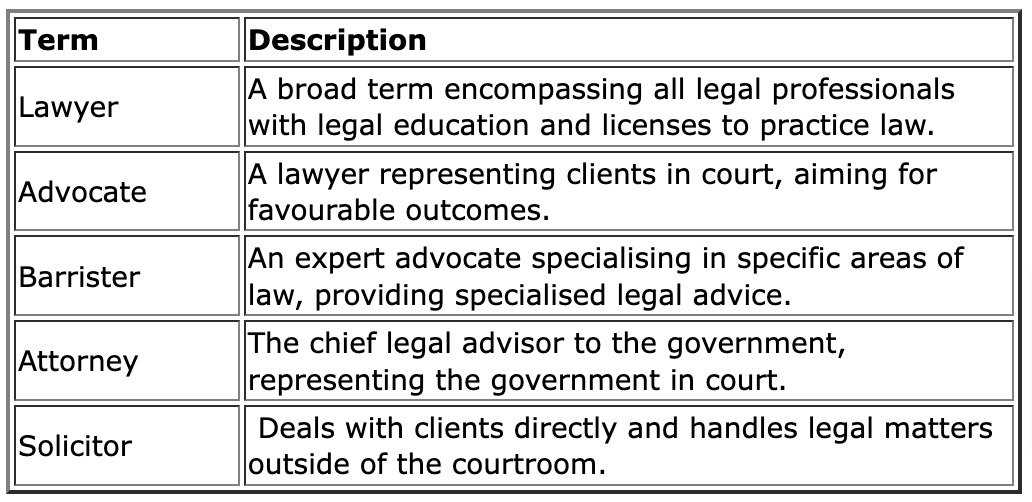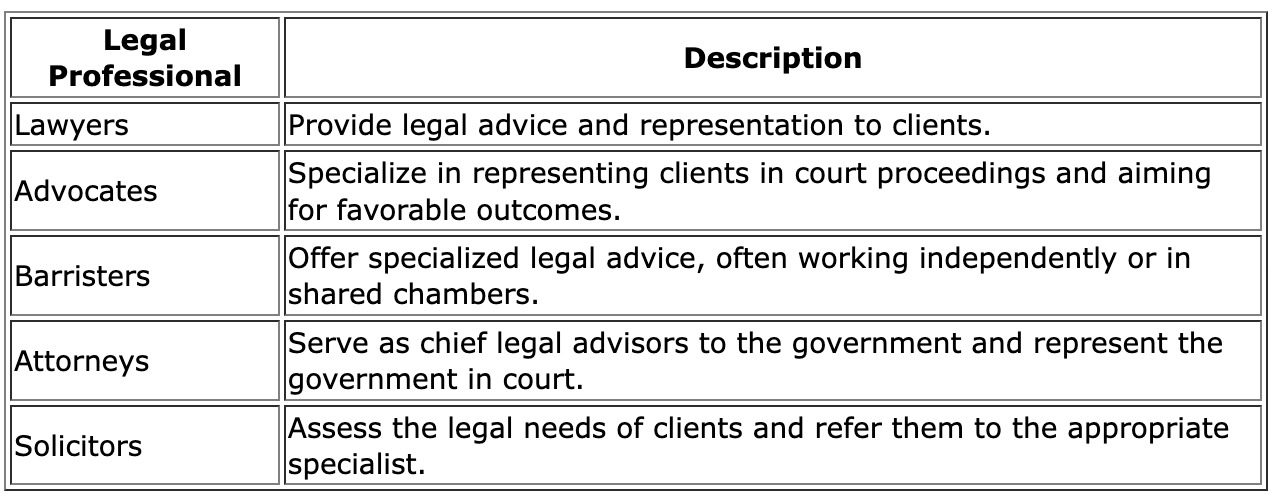What Is the Difference Between Lawyer Advocate and Barrister?

Date : 09 Nov, 2023
Post By admin
According to a recent study, 62% of people are unclear about the distinctions between lawyers, advocates, and barristers. In this article, we will provide a comprehensive analysis of these legal roles, shedding light on their unique responsibilities, qualifications, and court representation. We will also explore the concept of direct access and referral, as well as the scope of practice in different jurisdictions. By the end, readers will have a clear understanding of these differences, empowering them to make informed decisions when seeking legal assistance.
Key Takeaways
- Barristers and advocates are legal professionals who specialize in providing legal advice and representation but have different roles and responsibilities.
- To become a barrister or advocate, individuals must complete a law degree and pass the bar exam, followed by further specialized training.
- Barristers and advocates primarily represent clients in court proceedings, presenting arguments and making legal submissions.
- Depending on the jurisdiction, clients can approach barristers or advocates directly without the need for a solicitor, or they may need to go through a solicitor for referral.
Basic Difference Between Lawyer, Advocate, Barrister, Attorney & Solicitor


Education and Training Difference Lawyer, Advocate, Barrister, Attorney & Solicitor
To become a lawyer, advocate, barrister, attorney, or solicitor, individuals must undergo extensive education and training in the field of law. The education and training requirements for these legal professions vary depending on the jurisdiction, but there are some common elements. Here are three key points to understand about the education and training difference:
- Legal Degree: A foundational requirement for all these professions is completing a legal degree from an accredited law school. This provides individuals with a comprehensive understanding of the law and its application.
- Bar Exam: After obtaining a legal degree, aspiring lawyers, advocates, barristers, attorneys, and solicitors must pass a bar exam. This exam tests their knowledge and competence in the field of law and ensures that they meet the necessary qualifications to practice.
- Additional Qualifications: In addition to a legal degree and passing the bar exam, there may be additional qualifications and specialized training required. For example, barristers often undergo pupillage, which is a period of supervised training in a specific area of law. This further enhances their expertise and prepares them for courtroom representation.
The combination of educational qualifications, passing the bar exam, and additional specialized training ensures that individuals in these legal professions have the necessary knowledge, skills, and expertise to provide effective legal representation and advice to their clients.
Court Representation for Lawyer, Advocate, Barrister, Attorney & Solicitor
Courtroom representation is a crucial aspect of the roles and responsibilities of lawyers, advocates, barristers, attorneys, and solicitors. These legal professionals are entrusted with the task of representing their clients in court proceedings and providing expert legal advice and opinions. Whether it is presenting arguments, cross-examining witnesses, or making legal submissions, their aim is to effectively represent their clients and protect their rights and interests. They possess excellent advocacy skills and a deep understanding of the law, allowing them to articulate legal arguments persuasively. Their ability to handle pressure and prepare thoroughly for high-stakes cases is essential for the success of their clients' matters. Whether it is a lawyer, advocate, barrister, attorney, or solicitor, their main focus during court representation is to ensure their clients receive the best possible outcome in their legal matters.
Direct Access and Referral
During direct access and referral processes, clients have the option to directly approach barristers or advocates without the need for a solicitor. This provides clients with the freedom to choose their legal representation and have direct communication with their lawyer. Here are three key points to consider regarding direct access and referral:
- Cost-saving: Direct access allows clients to save costs by eliminating the need for a solicitor. They can directly engage with barristers or advocates, reducing the overall legal fees.
- Direct communication: Direct access enables clients to have direct communication with their legal representative, ensuring clear and efficient communication of their needs and concerns.
- Expert opinion: By approaching barristers or advocates directly, clients can benefit from their specialized knowledge and expertise in specific areas of law. They can obtain expert opinions and advice without intermediaries, enhancing the quality of legal representation.
Direct access and referral provide clients with greater control and flexibility in choosing their legal representation, while also promoting efficiency and cost-effectiveness.
Frequently Asked Questions
What Is the Difference Between a Lawyer, Advocate, Barrister, Attorney, and Solicitor?
A lawyer is a legal professional who provides advice and representation to clients. Advocates and barristers specialize in courtroom representation, while attorneys serve as chief legal advisors to the government. Solicitors refer clients to barristers or advocates.
Can a Lawyer Represent Clients in Court?
Yes, a lawyer can represent clients in court. Lawyers are legal professionals who provide legal advice and representation. They have the knowledge and expertise to present arguments and navigate the legal system on behalf of their clients.
What Specific Rights Do Advocates Have Under the Advocates Act, 1961?
Advocates, under the Advocates Act, 1961, have specific rights such as the right to practice in any court in India, the right to appear and plead on behalf of clients, and the right to take instructions directly from clients.
Are Barristers Only Qualified in England?
No, barristers are not only qualified in England. While the term "barrister" is commonly associated with the legal profession in England, other countries also have barristers who are qualified and practice under their respective legal systems.
What Is the Role of Attorneys in the Legal Field?
Attorneys serve as the chief legal advisors to the government, representing it in court and providing legal guidance. They hold a position of authority in the legal field and have the right of audience in all courts in India.
Conclusion
In conclusion, understanding the distinctions between lawyers, advocates, and barristers is essential for anyone seeking legal assistance. While these terms are often used interchangeably, they actually refer to distinct legal professionals with specific roles and responsibilities. By understanding their different education and training requirements, as well as their roles in court representation, individuals can make more informed decisions when seeking legal advice or representation. This knowledge also helps navigate the legal landscape and ensures access to the appropriate legal professional for their specific needs.





